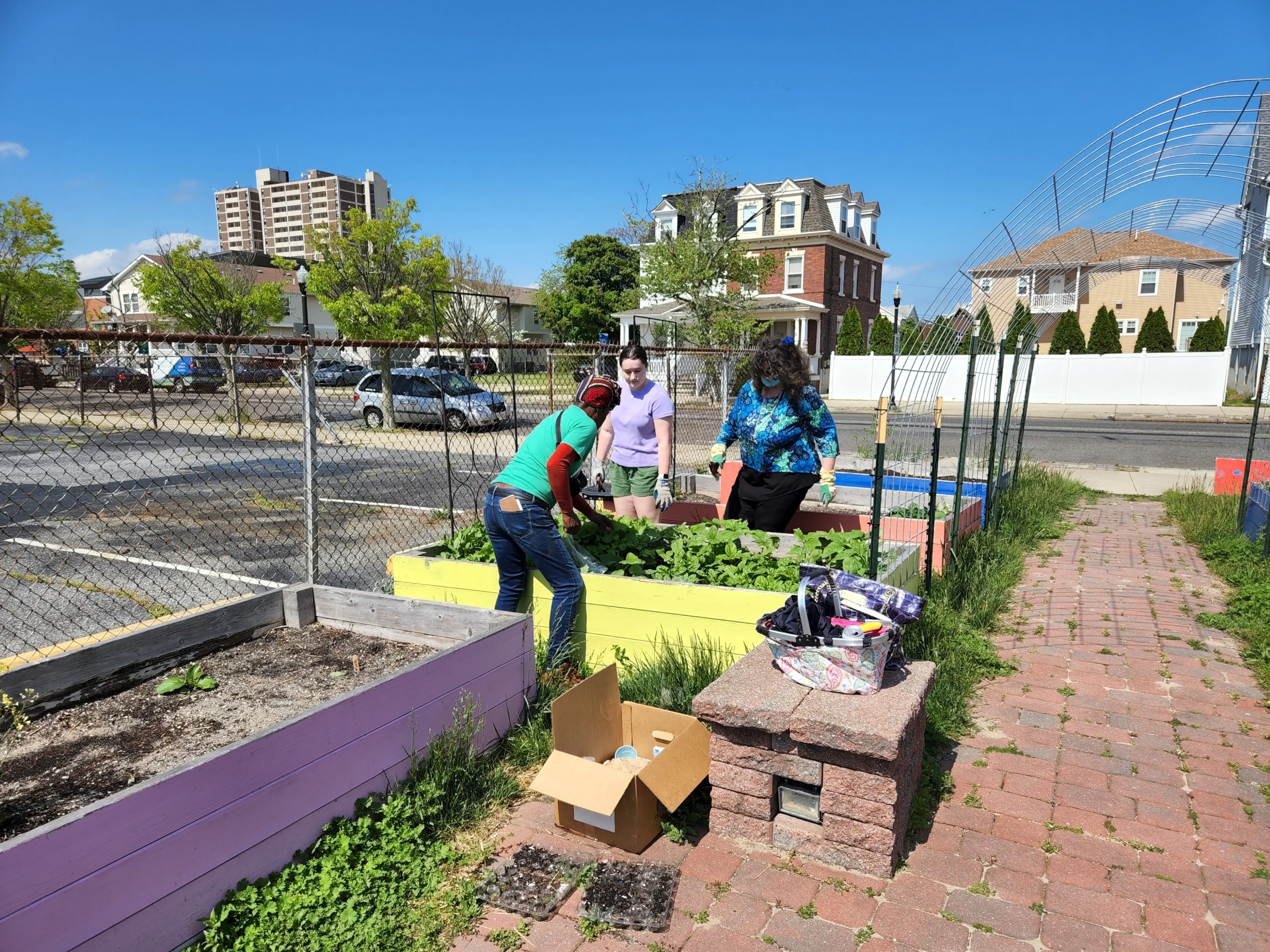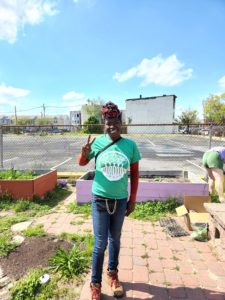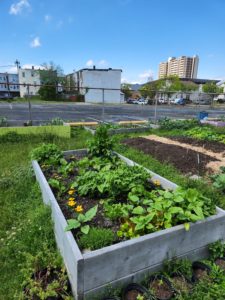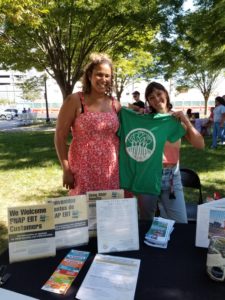
ATLANTIC CITY – There is some rejuvenation going on near Pennsylvania Avenue in Atlantic City, but if one drives by the empty concrete parking lots and abandoned buildings, they may miss it.
In a strip of land next to the former St. Monica Catholic Church, Paige Vaccaro, Ty Bey and the volunteers at the nonprofit CROPS—Communities Revolutionizing Public Spaces—have made their stand.

Volunteers work the CROPS Sister Jean community garden site in Atlantic City. Photo credit: AC JosepH Media
Broccoli, spinach, collard greens, peppers, and lettuce are among the vegetables growing in the urban garden in one of the poorest neighborhoods in New Jersey; a neighborhood mere blocks away from where the well-off live in fancy high-rises and tourists spend thousands on beachside vacations.
The mission of CROPS is to make sure all Atlantic City’s residents have the same opportunities to eat—and even grow—their own fresh vegetables in one of the region’s biggest food deserts.

Ty Bey, garden manager at CROPS, at the Sister Jean community garden in Atlantic City. Photo credit: AC JosepH Media
“Joining was a spiritual experience for me,” said Bey, a garden manager for CROPS while at the organization’s Sister Jean location at 108 N. Pennsylvania Ave. “This is a way of giving back and it’s giving me an opportunity to meet other people in the community. We all work together and teach people about sustainability and growing your own food. We talk about why it’s important for us to teach others and then just reciprocate off of each other.”
Vaccaro, an educator by trade, founded CROPS in 2016 with a vision of connecting communities and using gardens and sustainability to break down things like racism and stereotypes.
“Every community has room to grow. Some need more help than others,” Vaccaro told Shore Local in 2020. “Supporting our work helps us build positive events, improve access to healthy food, and support small businesses.”
The Rev. John Scotland is the executive director of Friends of Jean Webster Inc., the nonprofit food pantry that is working to reopen a kitchen in the back building of the shuttered St. Monica church. Now, they operate Sister Jean’s Pantry, where residents in the neighborhood lineup for free food items several times a week.
Scotland said when Vaccaro showed up at his doorstep saying she wanted to turn the patch of land next to the building into a community garden, he couldn’t say “yes” fast enough.
“The five census tracts we’re in the middle of [have] just extreme poverty, probably one of the worst pockets in the state,” Scotland said. “When Paige came to us and said ‘I’d like to start the garden here,’ we jumped at the chance to do it. She partnered with Cookie Till with Steven & Cookie’s [restaurant in Margate, New Jersey] and Cookie had all kinds of partners.

Vegetables growing at the CROPS Sister Jeans Garden in Atlantic City. Photo credit: AC JosepH Media
“They built the beds, got Atlantic City to donate the dirt, and Paige was off and running. They’re into their third season now.”
Scotland said he sees the garden as an important part of the movement to feed and uplift the neighborhood.
“It’s about using the food that we have access to,” Scotland said. “Let’s be clear about what we do here. It’s not just about hunger. We’re here to address poverty and alleviating poverty. So, if there’s anything we can do to alleviate poverty, it makes sense to us.
“We’re just the vessel for what the food bank is giving us, and Paige is doing a fantastic job with the garden.”
The wooden gardening boxes fill the green space next to the parking lot of the former church as neighborhood residents walk in and out from the pantry to the garden and then back home. Bey said they are welcomed to pick and grow their food from the garden.
For Bey, her involvement with the community gardens is deeply personal.
“I wanted to honor my ancestors, my forefathers and my foremothers,” Bey said. “This is getting back to exactly how the indigenous people lived. For me, this is just getting right back to that, and honoring them in the aspect of taking care of themselves along with taking care of Mother Nature.”
Bey said that the COVID-19 pandemic appeared to have struck a chord with many in the neighborhoods, with lockdown restrictions closing many establishments and limiting movements to places like grocery stores and eating establishments.
“When COVID-19 actually came, you saw how the government wasn’t there to support you,” Bey said. “So, we in the community had to get involved to be present so we could take care of ourselves. Community gardening was one of the ways we took care of ourselves during that time. Many of us started our own community gardens.”

CROPS’s Paige Vaccaro (L) and a volunteer at the Chelsea Atlantic City Farmer’s Market last year. Photo credit: AC JosepH Media
In addition to a successful farmer’s market in suburban Linwood and Pleasantville, CROPS started a fall farmer’s market in Atlantic City’s O’Donnell Park, which is within walking distance from some of the city’s neediest neighborhoods and a new residential hall for Stockton University Atlantic City students.
Vaccaro said it was so successful, CROPS will do it again this fall.
“We had a wonderful first season in the Chelsea [neighborhood],” Vaccaro told Front Runner New Jersey. “The locals came to support and also [people] from surrounding communities. People loved the variety and authenticity of our vendors, the performances and music.
“We decided to return to Chelsea and continue to build the relationships and partnerships that we made in the first year. This year we are authorized to accept SNAP/EBT and WIC. We are very grateful to be able to continue to serve the community.”
In a time where the pandemic and concentrated poverty have made it more difficult than ever to find sustainable food sources, Vaccaro, Bey and CROPS continue to make a difference one good community garden at a time.
This story was edited by Denise Clay-Murray, a veteran Philadelphia-based independent journalist, longtime member of the National Association of Black Journalists and a regular contributor to the Philadelphia Sunday Sun among other print and digital publications.
This story was co-produced in collaboration with CivicStory (www.civicstory.org) and the NJ Sustainability Reporting Project (www.SRhub.org).
